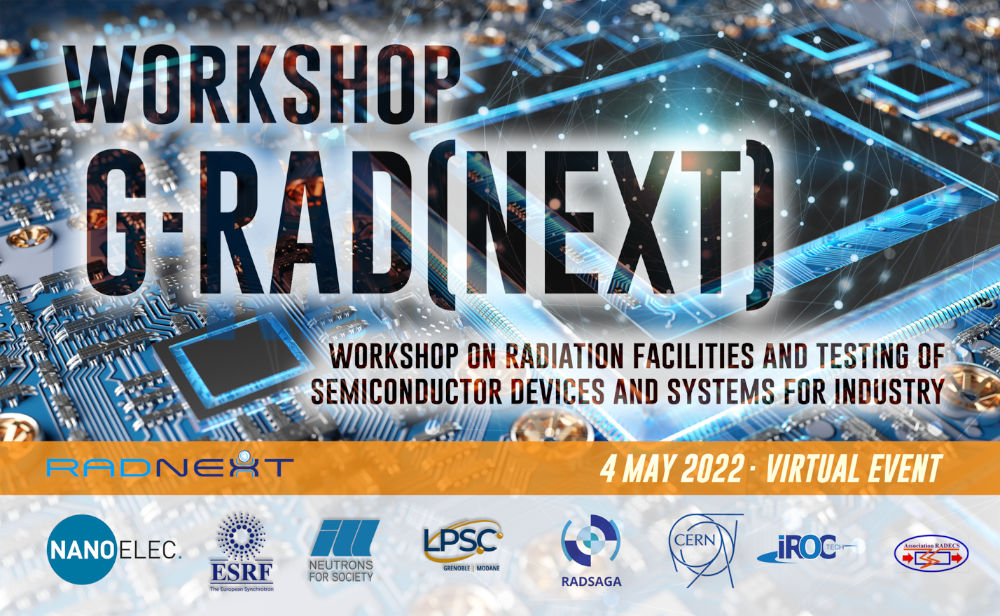G-RAD(NEXT) Workshop in May 2022

Invitation to
G-RAD(NEXT) Workshop 2022
The Workshop on Radiation Facilities and Testing of Semiconductor Devices and Systems for Industry
Date: May 4th, 2022
Virtual Event
Organizers: PAC-G (IRT nanoelec), RADECS association, RADNEXT
Program: https://indico.cern.ch/e/gradnext2022
Registration: https://esrf.zoom.us/meeting/register/tJMrcu2qrz8tGtB665YUIxKijTpSd_qbro1G
Description
Radiation effects in semiconductor devices have come to play a major role in the performance and reliability of today’s electronics. Several reliability questions also arise from new applications (such as self-driving cars, nanosatellites, medical implants etc.). As the demand for radiation hardness testing is on the rise, the availability of radiation facilities providing industrial access to perform these tests seems to be decreasing. Traditional testing methodologies also seem to be limited in face of new semiconductor technologies and applications.
Building upon the experience, notably linked to the very positive outcome and feedback of the G-RAD 2020 workshop, we propose you to join us to continue from where we left 2020 at the G-RAD(NEXT) workshop.
The workshop is organised in collaboration between the Platform for Advanced Characterisation (PAC-G), the RADECS association and RADNEXT. PAC-G is a service platform dedicated to the characterisation in micro and nanoelectronics developed in Grenoble in the context of the IRT Nanoelec, quite active in the business of irradiation. The RADECS association, created in 1992, aims to promote basic and applied science and research in the field of radiation and its effects on materials, components and systems for space and ground level applications. RADECS holds the annual RADECS European Conference and occasional RADECS workshops. It promotes research activities, scientific publications, co-operation and exchange with other relevant organisations on radiation effects. RADNEXT (https://radnext.web.cern.ch) is the first distributed research infrastructure for the irradiation community to offer EU-funded Transnational Access (TA) for precompetitive and publishable research activities for industry and academia. It is an initiative recently funded in the context of the Horizon 2020 programme connecting more than 30 partners across Europe and beyond (through TRIUMF’s participation), including most of the major facilities providing active in the domain of irradiation.
This workshop is dedicated to the whole industrial community where radiation effects in semiconductor devices play a crucial role: the chip designers, the foundries, the end users, the testing companies and the testing equipment manufacturers.
The aim of the workshop is to put together the testing facilities and radiation experts as well as stakeholders and users from industry and academia to stimulate discussion, in the framework of the RADNEXT Initiative.
This one-day workshop will take place as a virtual event.
Objectives
G-RAD(NEXT) will be an opportunity of exchange between representative from the industry and from the facilities, in order to:
- Communicate about what RADNEXT is and what it can do for industry
- Learn from industry how RADNEXT could deploy its services to have a larger impact on the technical challenges of the industrial community
Technical topics
The technical sessions of G-RAD(NEXT) will be organised around the core applications in the domain of irradiation. Each technical session will be organised in a similar manner.
At first, a presentation from a representative of the industrial stakeholder group will describe the main challenges and perspectives. Then, an introduction of the most adequate RADNEXT facilities to respond to the need of the user community will be provided. A discussion will follow, where concrete actions will be identified to mature more effective interactions between RADNEXT and the industrial community.
Target audience
- Companies providing or using radiation testing services and consultancy
- Facilities and research infrastructures providing access to users in the field of radiation testing or intending to provide access in the near future.
- Academics working in the field of radiation effects on semiconductors
- Organizations involved in the standardisation of testing methods and workflows
Desired Outcomes
Our goal is to increase the level of engagement of industry with the members of the RADNEXT consortium, with a growth of the industrial quota of transnational access and proprietary/confidential access (when needed). Our aim is to better serve the industrial community, and in this way to create value for the European Industry and increase the socio-economic impact of RADNEXT.